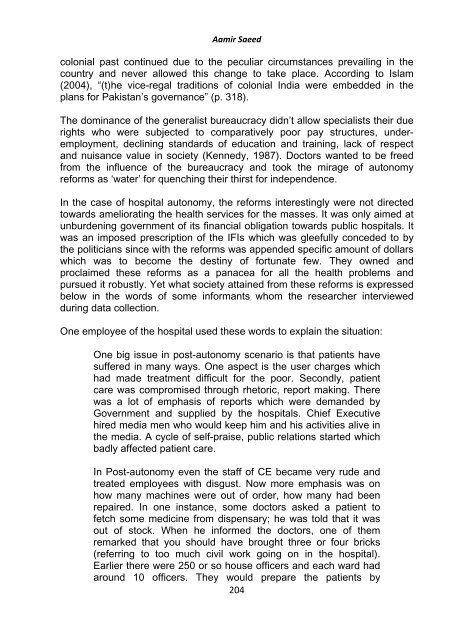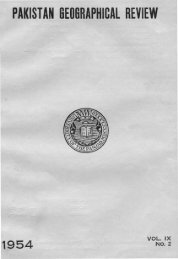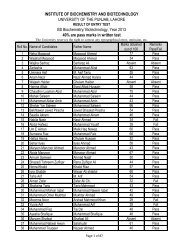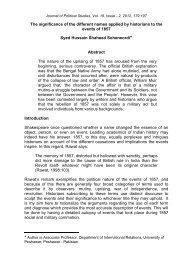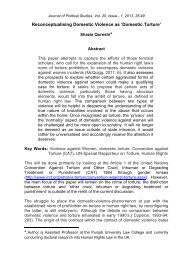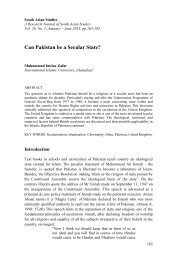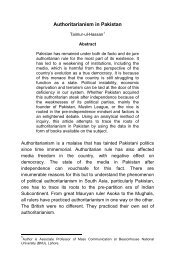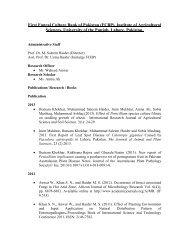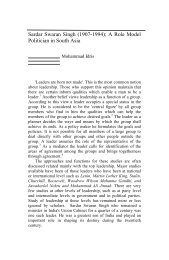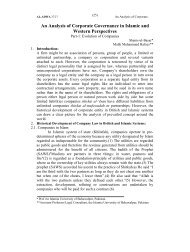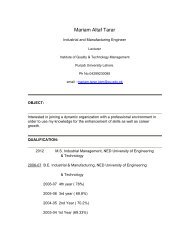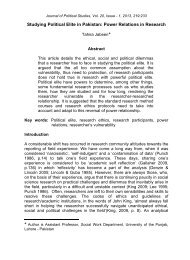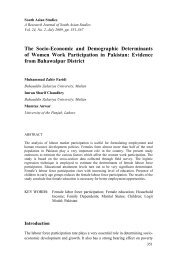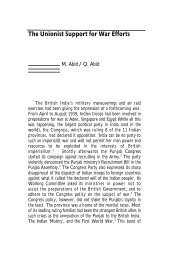Continuation of Colonial Policies by Aamir Saeed - University of the ...
Continuation of Colonial Policies by Aamir Saeed - University of the ...
Continuation of Colonial Policies by Aamir Saeed - University of the ...
You also want an ePaper? Increase the reach of your titles
YUMPU automatically turns print PDFs into web optimized ePapers that Google loves.
<strong>Aamir</strong> <strong>Saeed</strong><br />
colonial past continued due to <strong>the</strong> peculiar circumstances prevailing in <strong>the</strong><br />
country and never allowed this change to take place. According to Islam<br />
(2004), “(t)he vice-regal traditions <strong>of</strong> colonial India were embedded in <strong>the</strong><br />
plans for Pakistan’s governance” (p. 318).<br />
The dominance <strong>of</strong> <strong>the</strong> generalist bureaucracy didn’t allow specialists <strong>the</strong>ir due<br />
rights who were subjected to comparatively poor pay structures, underemployment,<br />
declining standards <strong>of</strong> education and training, lack <strong>of</strong> respect<br />
and nuisance value in society (Kennedy, 1987). Doctors wanted to be freed<br />
from <strong>the</strong> influence <strong>of</strong> <strong>the</strong> bureaucracy and took <strong>the</strong> mirage <strong>of</strong> autonomy<br />
reforms as ‘water’ for quenching <strong>the</strong>ir thirst for independence.<br />
In <strong>the</strong> case <strong>of</strong> hospital autonomy, <strong>the</strong> reforms interestingly were not directed<br />
towards ameliorating <strong>the</strong> health services for <strong>the</strong> masses. It was only aimed at<br />
unburdening government <strong>of</strong> its financial obligation towards public hospitals. It<br />
was an imposed prescription <strong>of</strong> <strong>the</strong> IFIs which was gleefully conceded to <strong>by</strong><br />
<strong>the</strong> politicians since with <strong>the</strong> reforms was appended specific amount <strong>of</strong> dollars<br />
which was to become <strong>the</strong> destiny <strong>of</strong> fortunate few. They owned and<br />
proclaimed <strong>the</strong>se reforms as a panacea for all <strong>the</strong> health problems and<br />
pursued it robustly. Yet what society attained from <strong>the</strong>se reforms is expressed<br />
below in <strong>the</strong> words <strong>of</strong> some informants whom <strong>the</strong> researcher interviewed<br />
during data collection.<br />
One employee <strong>of</strong> <strong>the</strong> hospital used <strong>the</strong>se words to explain <strong>the</strong> situation:<br />
One big issue in post-autonomy scenario is that patients have<br />
suffered in many ways. One aspect is <strong>the</strong> user charges which<br />
had made treatment difficult for <strong>the</strong> poor. Secondly, patient<br />
care was compromised through rhetoric, report making. There<br />
was a lot <strong>of</strong> emphasis <strong>of</strong> reports which were demanded <strong>by</strong><br />
Government and supplied <strong>by</strong> <strong>the</strong> hospitals. Chief Executive<br />
hired media men who would keep him and his activities alive in<br />
<strong>the</strong> media. A cycle <strong>of</strong> self-praise, public relations started which<br />
badly affected patient care.<br />
In Post-autonomy even <strong>the</strong> staff <strong>of</strong> CE became very rude and<br />
treated employees with disgust. Now more emphasis was on<br />
how many machines were out <strong>of</strong> order, how many had been<br />
repaired. In one instance, some doctors asked a patient to<br />
fetch some medicine from dispensary; he was told that it was<br />
out <strong>of</strong> stock. When he informed <strong>the</strong> doctors, one <strong>of</strong> <strong>the</strong>m<br />
remarked that you should have brought three or four bricks<br />
(referring to too much civil work going on in <strong>the</strong> hospital).<br />
Earlier <strong>the</strong>re were 250 or so house <strong>of</strong>ficers and each ward had<br />
around 10 <strong>of</strong>ficers. They would prepare <strong>the</strong> patients <strong>by</strong><br />
204


